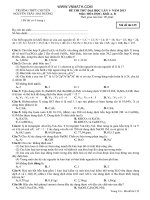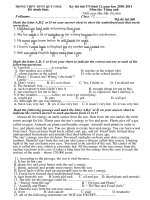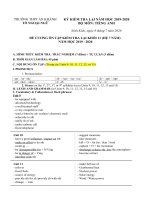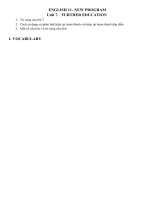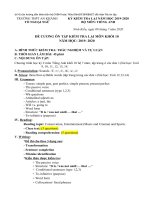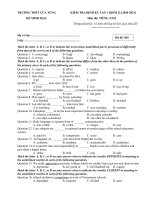- Trang chủ >>
- Y - Dược >>
- Điều dưỡng
De thi thu tn cho hs tb
Bạn đang xem bản rút gọn của tài liệu. Xem và tải ngay bản đầy đủ của tài liệu tại đây (125.82 KB, 4 trang )
<span class='text_page_counter'>(1)</span><div class='page_container' data-page=1>
<b>Đ</b>
<b> ề thi thử tốt nghiệp n</b>
<b> ă m học 2009-2010</b>
<i><b>Mark the letter A, B, C or D on your answer sheet to indicate the word whose underlined</b></i>
<i><b>part is pronounced differently from that of the rest in each of the following questions.</b></i>
<b>Câu 1: A. particular</b> <b>B. biologist</b> <b>C. attractive</b> <b>D. traditional</b>
<b>Câu 2: A. tooth</b> <b>B. theatre</b> <b>C. further</b> <b>D. thought</b>
<b>Câu 3: A. cut</b> <b>B. minute</b> <b>C. lunch</b> <b>D. hundred</b>
<b>Câu 4: A. choice B. chemistry</b> <b>C. cheap</b> <b>D. chicken</b>
<b>Câu 5: A. prevented</b> <b>B. needed</b> <b>C. decided</b> <b>D. worked</b>
<i><b>Mark the letter A,B,C or D on your answer sheet to indicate the correct answer to each of</b></i>
<i><b>the following questions</b></i>.
<b>Câu 6: Please _____ all the lights when you leave the room.</b>
<b>A. turn up</b> <b>B. turn off</b> <b>C. turn over</b> <b>D. turn into</b>
<b>Câu 7: Air _____ is a serious problem in many big cities.</b>
<b>A. polluting</b> <b>B. polluted</b> <b>C. pollutes</b> <b>D. pollution</b>
<b>Câu 8: Mary taught me _____ to play the violin.</b>
<b>A. what</b> <b>B. where</b> <b>C. when</b> <b>D. how</b>
<b>Câu 9: This is the village _____ he was born.</b>
<b>A. in which</b> <b>B. how</b> <b>C. when</b> <b>D. from which</b>
<b>Câu 10: Hoa: “How do you usually go to school?”</b>
Linh: “_____.”
<b>A. Half an hour</b> <b>B. On foot</b> <b>C. Five days a weekD. Two kilometres</b>
<b>Câu 11: The Pikes use energy-saving bulbs, and _____.</b>
<b>A. so do we</b> <b>B. we do, either</b> <b>C. we don’t use</b> <b>D. neither don’t we</b>
<b>Câu 12: Mr Black has coughed a lot and he has to _____ smoking.</b>
<b>A. hold up</b> <b>B. give up</b> <b>C. look up</b> <b>D. wash up</b>
<b>Câu 13: I understood what you said . _____, I didn’t agree with you .</b>
<b>A. Although</b> <b>B. However</b> <b>C. So</b> <b>D. Therefore</b>
<b>Câu 14: The woman _____ son is studying at that famous university is a scientist .</b>
<b>A. whose</b> <b>B. which</b> <b>C. who</b> <b>D. whom</b>
<b>Câu 15: I _____ home when I was sixteen to live with my grandparents in Sydney.</b>
<b>A. had left</b> <b>B. leave</b> <b>C. left</b> <b>D. have left</b>
<b>Câu 16: I turned on the electric fan _____ the room was hot .</b>
<b>A. so</b> <b>B. because</b> <b>C. despite</b> <b>D. although</b>
<b>Câu 17: You should show the interviewer that you are really keen _____ the job you have</b>
applied.
<b>A. on</b> <b>B. with</b> <b>C. for</b> <b>D. over</b>
<b>Câu 18: A _____ is a person who helps save people’s lives.</b>
<b>A. farmer</b> <b>B. tourist guide</b> <b>C. writer</b> <b>D. doctor</b>
<b>Câu 19: He would walk to work if he _____ near the office.</b>
<b>A. lived</b> <b>B. would live</b> <b>C. lives</b> <b>D. will live</b>
</div>
<span class='text_page_counter'>(2)</span><div class='page_container' data-page=2>
<b>A. in</b> <b>B. through</b> <b>C. on</b> <b>D. by</b>
<b>Câu 22: We couldn’t understand the teacher if he _____ too fast.</b>
<b>A. didn’t speak</b> <b>B. has spoke</b> <b>C. doesn’t speak</b> <b>D. spoke</b>
<b>Câu 23: He was waiting for the bus, _____?</b>
<b>A. wasn’t him</b> <b>B. wasn’t he</b> <b>C. was he</b> <b>D. waiting he</b>
<b>Câu 24: That man can tell us where _____</b>
<b>A. John living.</b> <b>B. does John live.</b> <b>C. do John live</b> <b>D. John lives.</b>
<b>Câu 25: There are a number of ways to help save _____ species .</b>
<b>A. endanger</b> <b>B. danger</b> <b>C. endangered</b> <b>D. dangerous</b>
<b>Câu 26: Donald Robbins, ______is forty-two years old and works in an office, began</b>
jogging a few years ago .
<b>A. who</b> <b>B. that</b> <b>C. whom</b> <b>D. he</b>
<b>Câu 27: We took a map with us _____.</b>
<b>A. so that we wouldn't get lost</b> <b>B. so that we won't get lost</b>
<b>C. in order to get lost</b> <b>D. so that we would get lost</b>
<b>Câu 28: John: “Would you like a cup of tea?”</b>
Mike: “_____.”
<b>A. Yes, thanks</b> <b>B. It’s my pleasure</b> <b>C. I’m sorry</b> <b>D. Yes, I do</b>
<b>Câu 29: She doesn’t type _____ as her friends.</b>
<b>A. most quickly</b> <b>B. more quickly</b> <b>C. so quickly</b> <b>D. quickly</b>
<b>Câu 30: </b>The ………... he was, the more cigarettes he smoked.
A. worried B. more worried C. less worried D. most worried
<i><b> Read the following passage and complete the sentences that follow by circling the </b></i>
<i><b>corresponding letter A, B, C or D. Mark your choice on the answer sheet.</b></i>
Susan was very nervous about her interview. For at least three weeks before it she
was worried about it.
She really wanted the job but she knew that a lot of people wanted to do that too.
She had been told that there were a great many applicants for it, so she prepared
herself. She made notes of what she might be asked and of what she wanted to ask.
When the day came, she arrived half an hour early. There were six other people waiting
to be interviewed. They looked much more confident than her. She began to feel even
more nervous. One by one, the others were called. Each of them came out looking
satisfied. Susan was the last one to be called into the interview room. She had decided
by then that she had no chance of getting the job, so she felt relaxed as she walked in; she
felt that she had nothing to lose. The three interviewers were all very serious and they
didn't seem to be interested in her. She forgot all the answers she had prepared and said
the first things that came into her head. Afterwards she was sure she wouldn't get the job,
but two days later she got a letter telling her she had been chosen because she had been
the only one who acted naturally.
<b>Câu 31. Susan was told that there were many </b> for the job.
A. application B. applicant C. apply D. applicants
<b>Câu 32. There were only </b> interviewees.
A.6 B.7 C.8 D. 9
</div>
<span class='text_page_counter'>(3)</span><div class='page_container' data-page=3>
C. looked more relaxed than her D. knew that she had no chance of getting the
job
<b>Câu 34. Susan won the job because she was the only one who </b> .
A. answered the questions naturally B. asked the questions naturally
C. acted naturally D. told naturally
<i><b>Mark the letter A, B, C, or D on your answer sheet to show the underlined part that needs</b></i>
<i><b>correction</b></i>.
<b>Câu 35:</b> After having dinner in that restaurant last night, I felt badly and my wife
A B
had to take me to the hospital.
C D
<b>Câu 36: W</b> h a t have t h e y sa y about t h e ir m a rr i a g e s ?.
A B C D
<b>Câu 37:</b> Although his family is poor, but he studies very well.
A B C D
<b>Câu 38: We should put the coffee table among the armchair and the wardrobe.</b>
A B C D
<b>Câu 39: Tom falls asleep now because of he stayed up too late last night.</b>
A B C D
<b>Câu 40: I’d like buying a new dictionary but I don’t have enough money</b>
A B C D
<i><b>Choose the correct sentence which has the same meaning as the given one.</b></i>
<b>Câu 41: I received a letter this morning. It really upset me.</b>
A. I received a letter this morning really upset me.
B. I received a letter this morning which really upset me.
C. I received a letter this morning in which really upset me.
D. I received a letter this morning of which really upset me.
<b>Câu 42. Lan doesn’t have enough time to do it well.</b>
A. If Lan had more time, she would do it well.
B. If Lan had more time, she will do it well.
C. If Lan had more time, she would have done it well
D. If Lan had more time, she did it well.
<b>Câu 43. "Where does Mai live? " he asked.</b>
A. He asked me where Mai lives.
B. He asked me where does Mai live.
C. He asked me where Mai lived.
D. He asked me where did Mai live.
<b>Câu 44. The flight to Washington lasted more than three hours.</b>
A. It take more than three hours to fly to Washington.
B. It took more than three hours fly to Washington.
C. It took more than three hours to fly to Washington.
D. It took three hours to fly to Washington
<b>Câu 45. My sister didn't leave the car key, so I couldn't pick her up at the airport.</b>
A. If my sister left the car key, I would pick her up at the airport.
</div>
<span class='text_page_counter'>(4)</span><div class='page_container' data-page=4>
D. If my sister had left the car key, I could pick her up at the airport.
<i><b>Read the following passage. Choose the best answer (A, B, C or D) to complete the </b></i>
<i><b>passage.</b></i>
We can (46) __________other people in many different ways. We can talk and write,
and we can send messages with our hands and faces. There is also the phone (including the
mobile!), the fax, and e-mail. Television, film, painting, and photography can also
communicate ideas.
Animals have ways of (47) __________ information, too. Bees dance and tell other
bees where to find food. Elephants make sounds that humans can’t hear. Whales sing songs.
Monkeys use their faces to show anger and love. But this is nothing (48) __________ to what
people can do. We have language – about 6,000 languages, in fact. We can write poetry, tell
jokes, make promises, explain, persuade, tell the truth, or tell lies. And we have a sense of
past and future, not just present.
Radio, film, and television (49) __________ a huge influence on society in the last
hundred years. And now we have the Internet, which is infinite. But what is this doing to
this? We can give and get a lot of information very quickly. But there is (50) __________
information that it is difficult to know what is important and what isn’t. Modern media is
changing our world every minute of every day.
<b>Câu 46. A. talk to</b> B. talk with C. communicate to D. communicate with
<b>Câu 47. A. changing B. transferring</b> C. exchanging D. giving
<b>Câu 48. A. compare B. comparing</b> C. is compared D. compared
<b>Câu 49. A. have</b> B. have had C. are having D. had
</div>
<!--links-->
